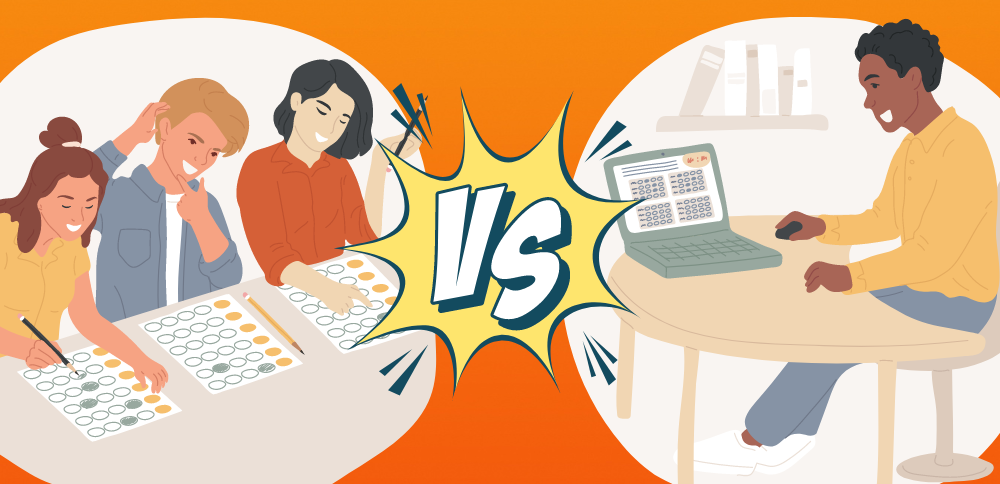Introduction
The night before your ACT can feel like the calm before the storm—or a whirlwind of last-minute panic. Whether you’re taking the traditional paper test or the newer digital format, having a strategic approach for those final hours can make a significant difference in your performance. This comprehensive guide will walk you through the ideal preparation routine for both testing formats, helping you approach test day with confidence and clarity.
Common Last-Minute Preparation Strategies
Regardless of which ACT format you’re facing, certain preparation principles remain universal:
Gather Your Materials Early
Don’t wait until morning to hunt for your essentials. The night before, prepare:
- Admission ticket (printed and ready)
- Valid photo ID
- #2 pencils (sharpened, with erasers)
- Approved calculator with fresh batteries
- Watch (non-digital for paper test)
- Snacks and water for breaks
- Directions to your testing center
Prioritize Rest Over Cramming
Research consistently shows that adequate sleep improves cognitive function, memory recall, and problem-solving abilities—all critical for ACT success. Aim for 8-9 hours of sleep rather than pulling an all-nighter.
Paper ACT: Night-Before Preparation
The traditional paper format has specific considerations for your final preparation:
Practice Efficient Bubbling
One unique aspect of the paper test is the need to transfer answers to the bubble sheet. Practice this timing-critical skill by:
- Working through 5-10 practice questions with the official answer sheet
- Practicing the rhythm of answering and bubbling simultaneously
- Double-checking that question numbers align with your bubble sheet
Prepare Your Scratch Work Strategy
Paper testing allows for extensive scratch work directly on the test booklet:
- Practice your notation system for eliminating wrong answers
- Develop shorthand techniques for math problems
- Plan your margin usage for quick calculations
Review Format-Specific Timing Strategies
With paper testing, you can:
- Skip challenging questions and return later without technological navigation
- Use physical markers (finger, pencil) to maintain your place
- Practice flipping between questions and sections efficiently
Digital ACT: Night-Before Preparation
The digital ACT presents unique opportunities and challenges:
Familiarize Yourself With the Testing Interface
If you haven’t already, spend 20-30 minutes:
- Taking the official ACT digital practice test
- Practicing with the on-screen calculator
- Getting comfortable with the flag and review functions
- Understanding how to navigate between questions
Practice Digital Annotation Techniques
Unlike the paper test, digital annotation requires specific skills:
- Use the highlight and strike-through tools efficiently
- Practice using the digital scratchpad for calculations
- Develop keyboard shortcuts for faster navigation
Prepare for Screen Fatigue
Digital tests can cause eye strain and fatigue:
- Adjust your screen time the night before to reduce digital fatigue
- Practice the 20-20-20 rule (every 20 minutes, look at something 20 feet away for 20 seconds)
- Plan for strategic eye breaks during the test
What NOT To Do the Night Before (Both Formats)
Avoid these common mistakes regardless of your test format:
- Don’t study new content—focus on reviewing what you already know
- Don’t change your sleep schedule dramatically
- Don’t consume alcohol or excessive caffeine
- Don’t engage in stressful activities or conversations
- Don’t schedule other demanding commitments
Morning-Of Considerations
Paper Test Morning Routine
- Wake up early enough for a proper breakfast
- Dress in comfortable layers (testing rooms can vary in temperature)
- Arrive 30-45 minutes early to find your testing room
- Complete any warm-up exercises (simple math calculations, reading a paragraph) to activate your brain
Digital Test Morning Routine
- Follow the same general preparations as paper testers
- Consider bringing blue light blocking glasses if you’re sensitive to screens
- Do a quick finger and wrist stretch to prepare for computer use
- Arrive early to get comfortable with the testing station setup
Conclusion: Confidence Through Preparation
Whether digital or paper, your ACT success largely depends on preparation completed long before the night before. However, these final hours can help optimize your testing mindset and readiness. Focus on rest, organization, and mental preparation rather than content cramming.
Remember that your test format choice should align with your personal strengths and preparation style. Some students perform better with the familiar paper format, while others benefit from the tools and features of the digital version.
By following these format-specific preparation strategies, you’ll maximize your potential and approach your ACT with confidence—regardless of which version you’re taking.










